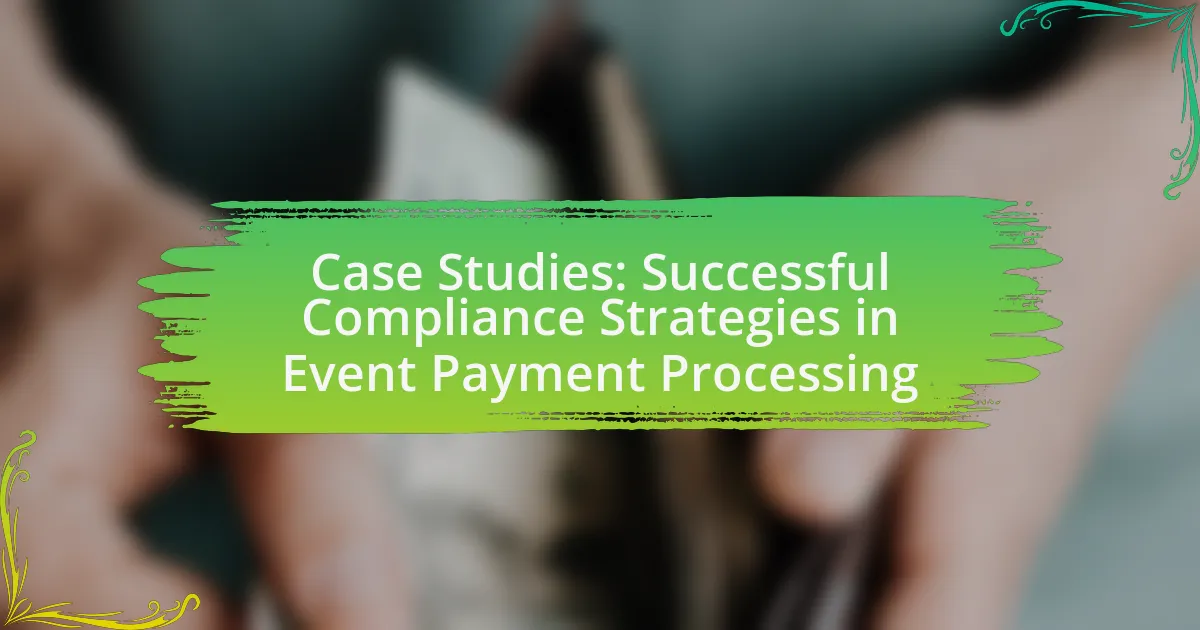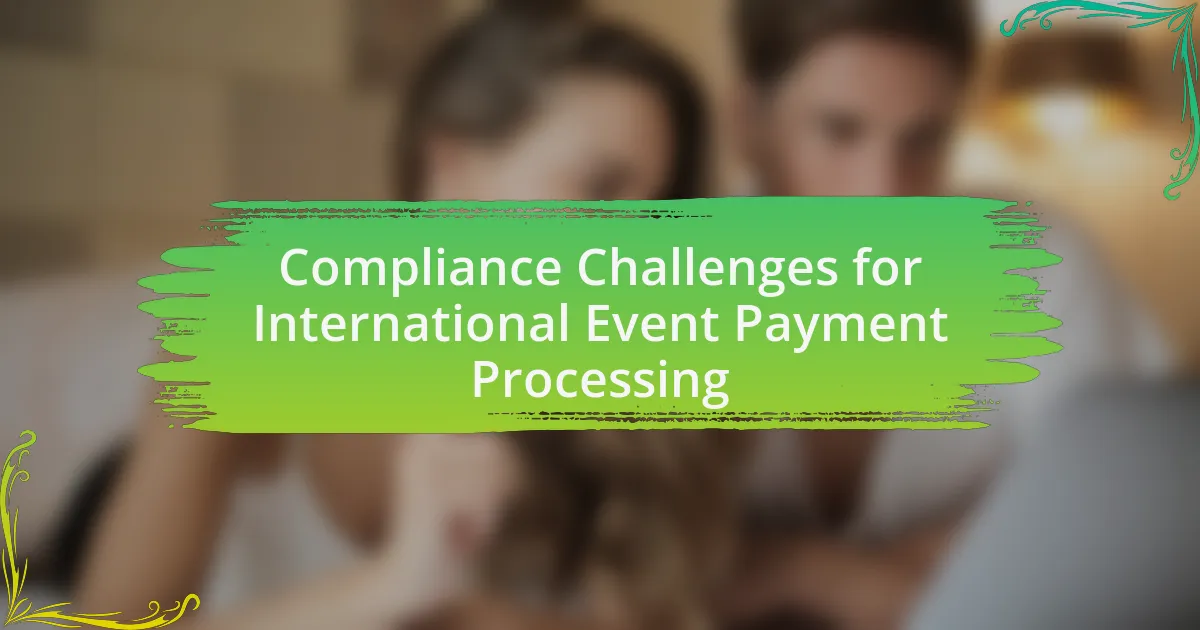Tax compliance in event ticket sales involves adhering to legal regulations regarding the collection and remittance of sales tax, accurate income reporting, and payment of applicable taxes at local, state, and federal levels. This article outlines the importance of tax compliance for event organizers, detailing the potential consequences of non-compliance, such as financial penalties and reputational damage. Key components of tax compliance, including accurate reporting, proper tax collection, and timely remittance, are discussed, along with the impact of varying jurisdictional requirements. Additionally, the article provides practical strategies for ensuring compliance, such as utilizing technology, maintaining thorough records, and staying informed about tax regulations.
What is Tax Compliance in Event Ticket Sales?

Tax compliance in event ticket sales refers to the adherence to tax laws and regulations governing the sale of tickets for events. This includes collecting and remitting sales tax on ticket sales, reporting income accurately, and ensuring that any applicable local, state, or federal taxes are paid. For instance, in the United States, many states require event organizers to charge sales tax on ticket sales, which must then be reported and submitted to the state tax authority. Failure to comply can result in penalties, fines, and legal issues for the event organizers.
Why is Tax Compliance important for Event Ticket Sales?
Tax compliance is crucial for event ticket sales because it ensures that businesses adhere to legal obligations, thereby avoiding penalties and legal issues. Non-compliance can lead to significant fines, legal actions, and damage to reputation, which can adversely affect sales and customer trust. For instance, the Internal Revenue Service (IRS) mandates that ticket sales are reported accurately, and failure to do so can result in audits and financial repercussions. Additionally, tax compliance fosters a fair marketplace by ensuring that all competitors operate under the same regulations, promoting healthy competition and consumer confidence.
What are the potential consequences of non-compliance?
The potential consequences of non-compliance in event ticket sales include significant financial penalties, legal repercussions, and reputational damage. Financial penalties can range from fines imposed by tax authorities, which may amount to thousands of dollars, to the requirement of paying back taxes with interest. Legal repercussions may involve audits, investigations, or even criminal charges for severe violations, particularly if fraudulent activities are detected. Reputational damage can lead to loss of customer trust and decreased sales, as consumers may choose to avoid businesses that are perceived as non-compliant with tax regulations. These consequences underscore the importance of adhering to tax compliance in the event ticket sales industry.
How does tax compliance impact the overall event industry?
Tax compliance significantly impacts the overall event industry by ensuring legal adherence and fostering trust among stakeholders. When event organizers comply with tax regulations, they mitigate the risk of legal penalties, which can lead to financial losses and damage to reputation. For instance, a study by the National Association of Ticket Brokers found that non-compliance can result in fines that exceed 20% of revenue for ticket sales. Additionally, tax compliance enhances transparency, which is crucial for attracting sponsors and investors who prioritize accountability. Overall, adherence to tax laws not only protects event organizers but also contributes to a more stable and trustworthy event ecosystem.
What are the key components of Tax Compliance in Event Ticket Sales?
The key components of tax compliance in event ticket sales include accurate reporting of ticket sales, proper collection of sales tax, and timely remittance of collected taxes to the appropriate tax authorities. Accurate reporting ensures that all revenue generated from ticket sales is documented, which is essential for calculating tax obligations. Proper collection of sales tax involves determining the correct tax rate based on the location of the event and the type of tickets sold. Timely remittance is crucial as it involves submitting the collected sales tax to the government within specified deadlines to avoid penalties. These components are vital for maintaining compliance with tax regulations and avoiding legal issues.
What types of taxes are applicable to event ticket sales?
Sales tax is the primary type of tax applicable to event ticket sales, as it is levied on the sale of goods and services in many jurisdictions. In addition to sales tax, some regions may impose local taxes, such as amusement taxes or entertainment taxes, specifically targeting events and performances. For instance, in cities like Chicago, an amusement tax is applied to ticket sales for concerts and sporting events, which can be a percentage of the ticket price. Furthermore, certain states may require the collection of value-added tax (VAT) on ticket sales, particularly for events held in countries where VAT is applicable. These taxes are enforced to ensure compliance with local and state revenue regulations, and failure to collect or remit these taxes can result in penalties for event organizers.
How do different jurisdictions affect tax compliance requirements?
Different jurisdictions significantly affect tax compliance requirements by establishing varying tax laws, rates, and reporting obligations. For instance, in the United States, each state has its own sales tax regulations, which can differ in rates and exemptions, impacting how event ticket sales are taxed. Additionally, local jurisdictions may impose their own taxes, such as city or county taxes, further complicating compliance for event organizers. This variability necessitates that businesses understand and adhere to the specific tax regulations applicable in each jurisdiction where they operate, as failure to comply can result in penalties and legal issues.
How can Event Organizers Ensure Tax Compliance?

Event organizers can ensure tax compliance by accurately tracking all income and expenses related to the event and understanding the specific tax obligations in their jurisdiction. This includes collecting sales tax on ticket sales, reporting income to tax authorities, and maintaining detailed records of all transactions. For instance, in the United States, the IRS requires event organizers to report income on Schedule C if they are self-employed, and they must also comply with state and local tax regulations, which can vary significantly. By implementing a robust accounting system and consulting with tax professionals, event organizers can navigate the complexities of tax compliance effectively.
What steps should event organizers take to comply with tax regulations?
Event organizers should first register their event with the appropriate tax authorities to ensure compliance with local tax regulations. This registration typically involves obtaining a tax identification number and understanding the specific tax obligations related to ticket sales, such as sales tax or value-added tax.
Next, they must accurately calculate and collect the required taxes on ticket sales, ensuring that the tax rate applied aligns with local laws. Event organizers should also maintain detailed records of all transactions, including ticket sales, tax collected, and any exemptions claimed, as these records are essential for accurate reporting and potential audits.
Additionally, they should file tax returns on time, reporting the collected taxes to the relevant authorities, and remit the owed amounts promptly to avoid penalties. Staying informed about changes in tax laws and regulations is crucial, as this knowledge helps organizers adapt their practices accordingly.
By following these steps, event organizers can effectively comply with tax regulations and minimize the risk of legal issues.
How can technology assist in ensuring tax compliance?
Technology assists in ensuring tax compliance by automating the tracking and reporting of sales transactions. Automated systems can accurately record ticket sales in real-time, reducing human error and ensuring that all revenue is accounted for. For instance, point-of-sale systems integrated with tax calculation software can automatically apply the correct tax rates based on location, ensuring compliance with local tax laws. Additionally, data analytics tools can monitor sales patterns and flag discrepancies, helping businesses identify potential compliance issues before they escalate. According to a report by the Tax Foundation, businesses that utilize technology for tax compliance can reduce their compliance costs by up to 30%, demonstrating the effectiveness of these technological solutions in maintaining accurate tax records.
What role do accounting practices play in tax compliance?
Accounting practices are crucial for ensuring tax compliance as they provide a systematic approach to recording, analyzing, and reporting financial transactions. Accurate accounting practices enable businesses to maintain clear records of income and expenses, which are essential for calculating taxable income. For instance, the Internal Revenue Service (IRS) requires businesses to keep detailed records to substantiate their tax returns, and failure to do so can result in penalties or audits. Furthermore, proper accounting practices help identify deductible expenses, ensuring that businesses do not overpay taxes. This is supported by the IRS guidelines, which emphasize the importance of maintaining accurate financial records for compliance purposes.
What are common challenges in ensuring tax compliance?
Common challenges in ensuring tax compliance include the complexity of tax regulations, varying jurisdictional requirements, and the difficulty in accurately tracking sales data. The complexity arises because tax laws can differ significantly between local, state, and federal levels, making it hard for businesses to stay compliant. Additionally, event ticket sales often involve multiple jurisdictions, especially for online sales, which complicates the tax calculation process. Accurate tracking of sales data is also challenging due to the high volume of transactions and the need for real-time reporting, which can lead to errors and potential non-compliance. These factors contribute to the overall difficulty in maintaining tax compliance in the event ticket sales industry.
How can event organizers overcome these challenges?
Event organizers can overcome challenges related to tax compliance in ticket sales by implementing robust accounting systems and collaborating with tax professionals. Utilizing specialized software can streamline the tracking of sales and tax obligations, ensuring accurate reporting. Additionally, engaging tax experts can provide guidance on local regulations and compliance requirements, reducing the risk of errors. According to a study by the National Association of State Treasurers, 70% of organizations that employed tax consultants reported improved compliance and reduced audit risks.
What resources are available for assistance with tax compliance?
Resources available for assistance with tax compliance include the Internal Revenue Service (IRS) website, which provides comprehensive guidelines and forms for tax obligations. Additionally, state tax agencies offer resources specific to local tax laws and compliance requirements. Professional tax advisors and accountants can also provide personalized assistance and ensure adherence to tax regulations. Furthermore, organizations such as the National Association of Tax Professionals (NATP) offer educational resources and support for tax compliance. These resources collectively help individuals and businesses navigate the complexities of tax obligations effectively.
What are the Best Practices for Maintaining Tax Compliance in Event Ticket Sales?

The best practices for maintaining tax compliance in event ticket sales include accurate record-keeping, understanding local tax laws, and timely tax remittance. Accurate record-keeping ensures that all sales transactions are documented, which is essential for reporting income and calculating taxes owed. Understanding local tax laws is crucial because tax rates and regulations can vary significantly by jurisdiction, affecting how much tax needs to be collected from ticket sales. Timely tax remittance is necessary to avoid penalties and interest, as failing to pay taxes on time can lead to financial repercussions. Following these practices helps ensure compliance with tax obligations and minimizes the risk of audits or legal issues.
How can event organizers stay updated on tax regulations?
Event organizers can stay updated on tax regulations by regularly consulting official government websites and subscribing to industry newsletters. Government websites, such as the IRS for the United States, provide the latest tax information and updates on regulations affecting event sales. Industry newsletters often summarize changes in tax laws and offer insights specific to event management, ensuring that organizers are informed about relevant compliance requirements. Additionally, attending workshops and seminars focused on tax compliance can provide practical knowledge and networking opportunities with tax professionals.
What strategies can be implemented for ongoing compliance monitoring?
Ongoing compliance monitoring can be effectively implemented through the use of automated tracking systems, regular audits, and employee training programs. Automated tracking systems utilize software to continuously monitor transactions and flag any discrepancies in real-time, ensuring that all ticket sales comply with tax regulations. Regular audits, conducted at predetermined intervals, help identify any compliance gaps and reinforce adherence to tax laws. Employee training programs educate staff on compliance requirements and updates, fostering a culture of accountability and awareness. These strategies collectively enhance the ability to maintain compliance in the dynamic environment of event ticket sales.
What are the consequences of failing to maintain tax compliance?
Failing to maintain tax compliance can result in severe financial penalties and legal repercussions. Tax authorities may impose fines that can accumulate over time, leading to significant financial strain on individuals or businesses. For instance, the IRS can charge penalties for late filing, which can be 5% of the unpaid tax for each month the return is late, up to a maximum of 25%. Additionally, non-compliance can lead to audits, which can further increase costs due to legal fees and potential back taxes owed. In extreme cases, persistent non-compliance may result in criminal charges, including tax evasion, which can lead to imprisonment.
How can event organizers mitigate risks associated with non-compliance?
Event organizers can mitigate risks associated with non-compliance by implementing comprehensive compliance strategies that include regular training, thorough documentation, and consultation with legal experts. Regular training ensures that all staff members are aware of the relevant tax laws and regulations, which reduces the likelihood of unintentional violations. Thorough documentation of all transactions and communications provides a clear audit trail, making it easier to demonstrate compliance if questioned by tax authorities. Consulting with legal experts helps event organizers stay updated on changes in tax legislation and best practices, further minimizing the risk of non-compliance.
What practical tips can help ensure tax compliance in event ticket sales?
To ensure tax compliance in event ticket sales, businesses should maintain accurate records of all transactions. This includes documenting ticket sales, refunds, and any applicable taxes collected. Accurate record-keeping is essential because it provides a clear audit trail, which is crucial for tax reporting and compliance with local, state, and federal regulations. Additionally, businesses must understand the specific tax obligations related to ticket sales in their jurisdiction, as tax rates and regulations can vary significantly. For instance, some states impose sales tax on ticket sales, while others may have exemptions for certain types of events. Regularly consulting with a tax professional can help businesses stay informed about changes in tax laws and ensure compliance.





